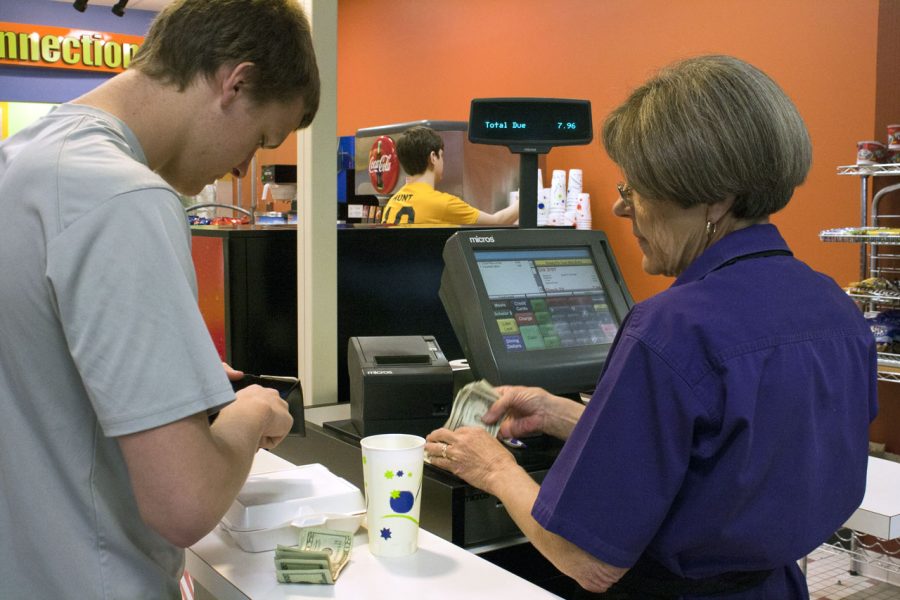Another fee, more food options in GUC
May 30, 2011
To help support new food concepts at UNA, all full-time, non-meal plan students will soon be charged a $75 declining balance on their MANE cards each semester as the university works to bring more restaurants to campus.
The $75 charge breaks down to students spending $5 per week, or $1 per day, on campus dining over a 15-week semester period. Alan Kinkead, general manager of Sodexo Dining Services, said the decision to implement the $75 charge was made after numerous surveys, focus groups and meetings were organized or distributed.
“The results showed that UNA was very interested in becoming a bigger, better school and that people expect a lot and are excited about bringing new brands and foods to campus,” he said. “Everybody demands so much more, but we need the support in order to propel the university to a whole new level.”
Kinkead said the $75 charge will apply to full-time students only and will aid the university in its vision to offer more diverse food options in the future. Einstein Bagels will take the place of Jazzman’s Café in the fall, alongside the addition of Moe’s Southwest Grill next spring in the GUC Atrium.
The charge will also go toward supporting new restaurants in the Academic Center and Student Commons, which is a part of UNA’s new master plan and is expected to begin construction next year. Kinkead said Chick-Fil-A, Starbucks and Frostbite are lined up to come to UNA in late 2012.
Other state universities require non-meal plan students to pay similar charges in order to sustain campus growth, according to David Shields, vice president of student affairs. The University of Alabama and Auburn University both require off-campus, non-meal plan students to pay a minimum $300 toward dining, while students at the University of Alabama at Birmingham must pay a $225 charge.
“I think it’s a good idea for me because I’m already paying money for food on campus anyway, but I don’t know that it should be so forced,” said UNA sophomore Katie Birth, an off-campus student who spends at least $10-15 per week on campus dining. “If you’re living on campus or are a full-time student, it’s not that big of a deal, but if you’re a non-traditional student, I just don’t think that’s fair.”
Students will be charged $75 each semester beginning in the fall, and can use the declining balance card like cash or a debit card at any campus restaurant or vending machine. Funds that are left on a MANE card will automatically roll over to the next semester, officials said.
Officials have not yet determined whether distance learning students will be required to pay the charge. Shields said the university will work to make more campus dining options available at night for students who attend evening classes after the charge is implemented.
“Food service providers come to universities today not inclined to add new things, and need to help retain their investment,” Shields said. “Students expect and deserve new things on campus, but food services expect business. Like anything we do, it’s not free. The benefits that are coming and the sense of community that will be developed outweigh the negative of paying the 75 bucks.”
Shields and Dr. W. Stephen Smith, vice president of Business and Financial Affairs, hope the new dining additions throughout the next two years will help to ease parking issues on campus, as students will be less likely to leave the university for lunch or dinner and lose their parking spot in the process.
“I like the idea that the $75 charge is bringing more restaurants on campus,” said Patrick O’Kelley, a UNA freshman who does not have a meal plan. “If they could find a way to determine who would benefit the most from it, then they could charge it to them. I don’t normally eat on campus, but if I am going to be charged $75, I would.”
UNA and Sodexo will meet at the Board of Trustees meeting in June to discuss the $75 charge further and determine final details about the declining balance. Smith said students will likely have mixed feelings about the charge but that UNA will continue to push its food service provider to be more current and modern for students.
“If you look at how UNA was and how it is now, you will see more change on campus in the next five years than you have in the last 20 years,” Smith said.


